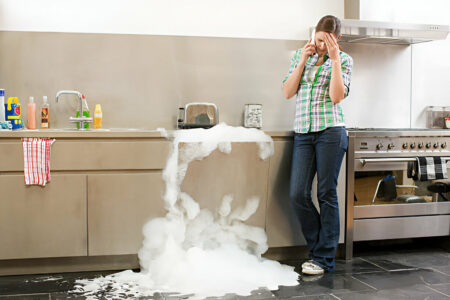Dealing with overflowing drains can be a homeowner’s worst nightmare. Not only is it messy, but it can also cause significant damage to your property and pose health risks. Understanding why drains overflow and knowing how to address and prevent the issue is crucial. In this comprehensive guide, we will explore the common causes of overflowing drains, effective solutions, and preventive measures to keep your plumbing system in top shape.
Understanding the Causes of Overflowing Drains
1. Clogged Pipes
- Grease and Food Particles: Kitchen sinks are especially prone to clogs due to grease and food particles.
- Hair and Soap Scum: Bathroom drains often get blocked by hair and soap residue.
- Foreign Objects: Items like sanitary products, wipes, and toys can cause serious blockages.
2. Tree Roots
- Invasive Roots: Tree roots can penetrate sewer lines, causing blockages and damage.
- Cracks and Gaps: Older pipes with cracks are more susceptible to root intrusion.
3. Heavy Rainfall
- Stormwater Overload: Excessive rain can overwhelm drainage systems, leading to overflows.
- Flooding: Poor drainage around the property can result in water backing up into the house.
4. Structural Issues
- Collapsed Pipes: Older or poorly installed pipes can collapse, restricting flow.
- Misaligned Pipes: Incorrectly connected pipes can cause water to back up.
Immediate Actions to Take When Drains Overflow
1. Turn Off the Water Supply
- Prevent Further Flooding: Stop the flow of water to minimize damage.
2. Clear the Area
- Remove Valuable Items: Protect your belongings from water damage.
3. Use a Plunger
- Simple Blockages: A plunger can often dislodge minor clogs.
4. Try a Drain Snake
- Stubborn Clogs: A drain snake can reach deeper blockages.
5. Call a Professional Plumber
- Severe Issues: For persistent or severe blockages, professional help is necessary.
Effective Solutions for Clearing Blocked Drains
1. Chemical Drain Cleaners
- Quick Fix: These can dissolve minor clogs but should be used sparingly to avoid pipe damage.
2. Enzymatic Cleaners
- Eco-Friendly: These use natural enzymes to break down organic material.
3. Hydro Jetting
- High-Pressure Cleaning: Uses a high-pressure stream of water to clear pipes.
4. Pipe Replacement
- Long-Term Solution: For damaged or old pipes, replacement might be necessary.
Preventive Measures to Avoid Overflowing Drains
1. Regular Maintenance
- Routine Cleaning: Regularly clean your drains to prevent build-up.
- Professional Inspections: Have a plumber inspect your system annually.
2. Proper Disposal Practices
- Avoid Grease and Food: Dispose of these in the trash, not the sink.
- Use Drain Covers: Prevent hair and debris from entering the drains.
3. Tree Management
- Root Barriers: Install barriers to prevent roots from reaching your pipes.
- Regular Inspections: Check for tree root intrusion regularly.
4. Install a Backwater Valve
- Prevent Backflow: This valve prevents sewage from backing up into your home during heavy rain.
The Role of Technology in Preventing Drain Overflows
1. Smart Sensors
- Early Detection: Sensors can alert you to potential blockages before they become severe.
2. Camera Inspections
- Visual Inspection: Cameras can identify issues within pipes without invasive digging.
3. Automatic Shutoff Valves
- Emergency Prevention: These valves can automatically shut off the water supply in case of an overflow.
Impact of Overflowing Drains on Property and Health
1. Water Damage
- Structural Damage: Water can weaken foundations and walls.
- Mold Growth: Standing water can lead to mold, which is hazardous to health.
2. Health Risks
- Bacterial Contamination: Sewage overflow can introduce harmful bacteria into your home.
- Respiratory Issues: Mold and mildew can cause respiratory problems.
How to Stop Drain Overflow: A Comprehensive Guide
Drain overflow is a common but serious issue that can lead to property damage and health hazards. Knowing how to stop drain overflow promptly can save you time, money, and stress. This guide provides practical steps and preventive measures to help you manage and prevent drain overflow effectively.
Understanding the Causes of Drain Overflow
1. Blockages
- Grease and Food Particles: Common in kitchen sinks.
- Hair and Soap Scum: Frequent culprits in bathroom drains.
- Foreign Objects: Items like wipes, sanitary products, and toys.
2. Heavy Rainfall
- Stormwater Overload: Excessive rain can overwhelm drainage systems.
- Poor Landscaping: Inadequate drainage around your home can exacerbate the problem.
3. Pipe Damage
- Cracked or Collapsed Pipes: Age and wear can lead to structural failures.
- Tree Roots: Roots can invade and block sewer lines.
Immediate Actions to Stop Drain Overflow
1. Turn Off the Water Supply
- Prevent Further Damage: Shutting off the water can stop the overflow from worsening.
2. Use a Plunger
- Effective for Minor Blockages: Create a seal and plunge vigorously to dislodge the clog.
3. Try a Drain Snake
- For Stubborn Clogs: Insert the snake into the drain and rotate to break up the blockage.
4. Clear the Area
- Remove Water and Debris: Use towels and buckets to remove excess water and debris around the drain.
5. Call a Professional Plumber
- For Persistent Issues: If DIY methods fail, a plumber can diagnose and fix the problem.
Conclusion!!
Overflowing drains are more than just an inconvenience; they can cause significant damage and pose serious health risks. By understanding the causes, taking immediate action, and implementing preventive measures, you can protect your home and ensure your plumbing system runs smoothly. Regular maintenance and the use of modern technology can greatly reduce the risk of drain overflows, keeping your home safe and dry.
FAQs
- What should I do immediately if my drain overflows?
- Turn off the water supply, clear the area, and try using a plunger or drain snake. If the issue persists, call a professional plumber.
- Can tree roots really damage my pipes?
- Yes, tree roots can penetrate and block sewer lines, causing significant damage and blockages.
- How often should I have my drains professionally inspected?
- It’s recommended to have a professional inspection annually to catch potential issues early.
- Are chemical drain cleaners safe for my pipes?
- They can be effective for minor clogs but should be used sparingly to avoid damaging your pipes.
- What is hydro jetting, and when should I consider it?
- Hydro jetting is a high-pressure cleaning method for severe blockages. Consider it when traditional methods fail to clear the clog.




